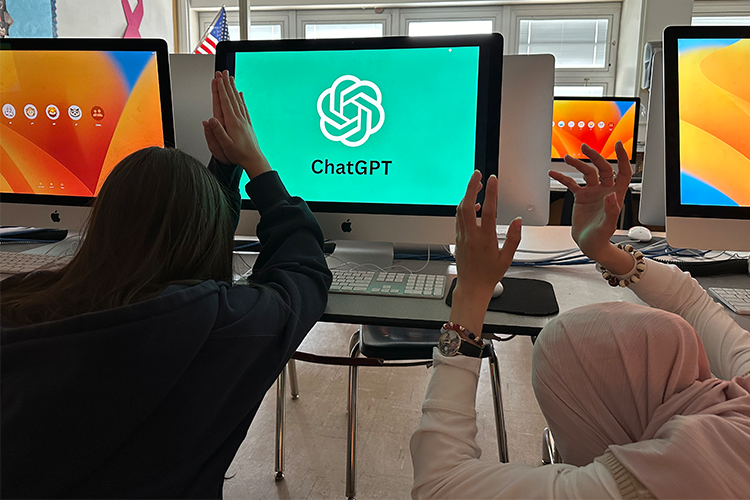
Students pray to their savior, ChatGPT, in the trying time of finals week. photo by Ravi Apte
AI engines may be developing the potential to be even more useful to students than well known tools such as Google.
Artificial intelligence (AI) has been one of the hottest topics of this decade. In the early 2010s, college and high school students began to use AI software like ChatGPT to write essays or do entire math problems in an instant. This initially produced the conception that the only functional use of AI in a classroom setting is cheating, however, we as a society may have brushed off ChatGPT too quickly. If used responsibly, artificial intelligence could enhance the learning process in the same way that the internet has.
Although there are no current widespread implementations of AI in a classroom setting, this doesn’t mean that there can’t be in the future. The key to making AI programs such as ChatGPT a learning tool instead of a vehicle for cheating are parameters. Currently, AI engines available to the public utilize many parameters set to limit the responses given to users. This prevents users from obtaining illegal or unethical information from the AI such as recipes for drugs or instructions for crafting crude weapons. Theoretically, a school could have a personalized version of the AI that limits responses given to students. By placing specific parameters, the AI could be used as a tool to help students better understand a concept without giving them an easy way out.
The internet forever changed the way students across all grades learn content in their classes. Before the internet and computers, students used libraries filled with books accounting for knowledge of all kinds. Now, that same knowledge is easily accessible through online encyclopedias and articles. Using internet search engines such as Google or alternatives like DuckDuckGo, these vast amounts of knowledge can be filtered down to a small list of results relating solely to what was searched.
AI has the potential to create a change as significant as the internet, greatly enhancing the process of searching the web. For example, if a student wanted to learn about the War of 1812, they could search for something along the lines of “key facts about the War of 1812” on Google. Google will then give the student many hyperlinks to well-known sites such as Britannica orHistory.com. From there the student would have to read the information from those sites and compile the information they learned into a list containing the key facts they desire.
Now let’s say the student puts the same search prompt into an AI such as ChatGPT 3.5 or Microsoft Copilot (preview). AI would give the student a clear-cut bullet point list of the key facts about the War of 1812. Of course, as of right now, AI isn’t exactly the most reliable source for students to use for important projects or papers, and whatever results are generated should be taken with a grain of salt. Although it might not be polished enough to surpass traditional search engines right now, it is clear that the AI’s potential is prolific. Once the technology has advanced enough to routinely give reliable information, there is really no reason for students not to use AI as a learning tool.
Of course, the idea of students using AI at all – parameters or not – still leaves an ethical debate up in the air. AI is such a new development in technology that we have not had time to fully understand the ethical, moral, and legal implications it will likely introduce to our lives. The internet itself was also fairly controversial before it morphed into a mainstay in its rapidly modernizing world. Just like with the internet, AI still has a lot of growth to go through before it can be fully utilized for practical applications. As AI continues to grow and advance, its impact, especially on the lives of students, will increase dramatically. If educators and educational institutions are able to embrace this change rather than run from it, then perhaps this incredible, new technology can be used for learning in lieu of academic dishonesty. For more in depth information about the current state of AI in the classroom check out this Denver Post article featuring Thomas Jefferson faculty member Amber Wilson.